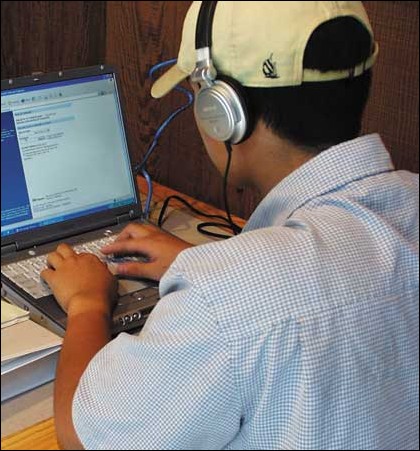Rip, mix, burn…steal?

Image: Rip, mix, burn…steal?:Photo by Rachelle SterlingState HornetA student listens to mp3s on his computer while studying in the University Union. :
September 18, 2002
Sacramento State enforces policy regarding the proper use of the campus computer system in attempt to prevent copyright infringement, despite frequent violations by students.
According to Donna Selnick, of the University Counsel, the University Computing and Telecommunications policy contains a list of the users’ responsibilities towards appropriate application, and it specifically refers to copyright violation as improper use.
“The downloading of music, the downloading of copyrighted work and the borrowing of copyrighted work without paying for it is copyright violation,” Selnick said.
The University Computing and Telecommunications Security Policy states that improper use prevents others from accessing public facilities.
Under this policy, improper use is defined as any use of computing or networking facilities or services that are unrelated to legitimate instruction which interferes with another’s legitimate access, and therefore, not only violates another’s intellectual property rights but also violates any local, state or federal law.
The University Computing and Communications Services enforces such policies in consultation with Selnick, administrators and other staff depending upon the complaint.
Copyright problems are brought to light from the direct complaints of copyright holders who were able to track improper usage to the university’s computer system, Selnick said.
Potential violators are approached in a variety of steps depending upon the incident.
“We have been known in some cases to immediately shut down the (student’s Sac Link) account until we have time to investigate and find out whether the person should be able to continue to have access to the system,” Selnick said.”Other times it’s a cease and desist-stop doing that, it’s against the policy and you will be punished in terms of not getting access to the system if you continue.”
Last updated April 12, 2000, the policy is in the midst of another review with probable changes in the following months because it is an issue that is constantly changing through the courts, through the legislature at congress or with the invention of new devices.
“It’s one of those fast moving targets for regulation, and in terms of what regulations the campus should have in order to allow everyone to have good access to computers for their education,” Selnick said.
Charles Cozad, a Sac State sophomore, admits to having downloaded music at home, but he feels that students on campus, primarily those who live in the dorms, have a greater opportunity of downloading copyrighted music.
“They have access to a higher speed of Internet connection because it’s in their living space,” Cozad said.
Though Cozad was not aware of copyright policies on campus, he assumed the university discouraged copyright violations.
Cozad said students should use discretion and limit their activities on campus for learning.
Sac State senior Marie Harbison recalled that she had encountered students in the Computer Engineering lab using their laptops for downloading music.
Harbison said she knew about the campus’ policies, but that such policies do not hinder students.”I believe most students know (about the policies) but still do it because the motivation is free music,” Harbison said, “Why spend the full amount of money on one CD?”
Harbison also agrees that the college’s faster connection is reason enough for students to use its resources.
Policies, like the University Computing and Telecommunications Security Policy, pertain not only to students on campus but also staff, faculty and anyone with access to the campus computer system.












































































































































